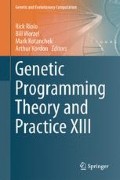Abstract
Lexicase selection is a selection method for evolutionary computation in which individuals are selected by filtering the population according to performance on test cases, considered in random order. When used as the parent selection method in genetic programming, lexicase selection has been shown to provide significant improvements in problem-solving power. In this chapter we investigate the reasons for the success of lexicase selection, focusing on measures of population diversity. We present data from eight program synthesis problems and compare lexicase selection to tournament selection and selection based on implicit fitness sharing. We conclude that lexicase selection does indeed produce more diverse populations, which helps to explain the utility of lexicase selection for program synthesis.
Access this chapter
Tax calculation will be finalised at checkout
Purchases are for personal use only
Notes
- 1.
- 2.
For some of these problems, each test case generates multiple error values because we apply more than one error function.
- 3.
References
Helmuth T, Spector L (2015) General program synthesis benchmark suite. In: Silva S, Esparcia-Alcazar AI, Lopez-Ibanez M, Mostaghim S, Timmis J, Zarges C, Correia L, Soule T, Giacobini M, Urbanowicz R, Akimoto Y, Glasmachers T, Fernandez de Vega F, Hoover A, Larranaga P, Soto M, Cotta C, Pereira FB, Handl J, Koutnik J, Gaspar-Cunha A, Trautmann H, Mouret JB, Risi S, Costa E, Schuetze O, Krawiec K, Moraglio A, Miller JF, Widera P, Cagnoni S, Merelo J, Hart E, Trujillo L, Kessentini M, Ochoa G, Chicano F, Doerr C (eds) GECCO ’15: Proceedings of the 2015 on genetic and evolutionary computation conference. ACM, Madrid, pp 1039–1046. doi:10.1145/2739480.2754769. http://doi.acm.org/10.1145/2739480.2754769
Helmuth T, Spector L, Matheson J (2014) Solving uncompromising problems with lexicase selection. IEEE Trans Evol Comput. doi:10.1109/TEVC.2014.2362729
Jackson D (2010) Promoting phenotypic diversity in genetic programming. In: Schaefer R, Cotta C, Kolodziej J, Rudolph G (eds) PPSN 2010 11th international conference on parallel problem solving from nature. Lecture notes in computer science, vol 6239. Springer, Krakow, pp 72–481. doi:10.1007/978-3-642-15871-1_48
Maechler M, Rousseeuw P, Struyf A, Hubert M, Hornik K (2014) Cluster: Cluster Analysis Basics and Extensions. R package version 1.15.3
McKay RI (2000) Fitness sharing in genetic programming. In: Proceedings of the genetic and evolutionary computation conference. Morgan Kaufmann, Las Vegas, pp 435–442
R Core Team (2014) R: A language and environment for statistical computing. R Foundation for Statistical Computing, Vienna. http://www.R-project.org/
Spector L (2012) Assessment of problem modality by differential performance of lexicase selection in genetic programming: a preliminary report. In: 1st workshop on understanding problems (GECCO-UP). ACM, Philadelphia, pp 401–408. doi:10.1145/2330784.2330846
Spector L, Robinson A (2002) Genetic programming and autoconstructive evolution with the push programming language. Genet Program Evolvable Mach 3(1):7–40. doi:10.1023/A:1014538503543
Spector L, Klein J, Keijzer M (2005) The push3 execution stack and the evolution of control. In: GECCO 2005: Proceedings of the 2005 conference on Genetic and evolutionary computation, vol 2. ACM, Washington, pp 1689–1696. doi:10.1145/1068009.1068292
Acknowledgements
Thanks to the members of the Hampshire College Computational Intelligence Lab for discussions that helped to improve the work described in this chapter, to Josiah Erikson for systems support, and to Hampshire College for support for the Hampshire College Institute for Computational Intelligence. This material is based upon work supported by the National Science Foundation under Grants No. 1017817, 1129139, and 1331283. Any opinions, findings, and conclusions or recommendations expressed in this publication are those of the authors and do not necessarily reflect the views of the National Science Foundation.
Author information
Authors and Affiliations
Corresponding author
Editor information
Editors and Affiliations
Rights and permissions
Copyright information
© 2016 Springer International Publishing Switzerland
About this chapter
Cite this chapter
Helmuth, T., McPhee, N.F., Spector, L. (2016). Lexicase Selection for Program Synthesis: A Diversity Analysis. In: Riolo, R., Worzel, W., Kotanchek, M., Kordon, A. (eds) Genetic Programming Theory and Practice XIII. Genetic and Evolutionary Computation. Springer, Cham. https://doi.org/10.1007/978-3-319-34223-8_9
Download citation
DOI: https://doi.org/10.1007/978-3-319-34223-8_9
Published:
Publisher Name: Springer, Cham
Print ISBN: 978-3-319-34221-4
Online ISBN: 978-3-319-34223-8
eBook Packages: Computer ScienceComputer Science (R0)

